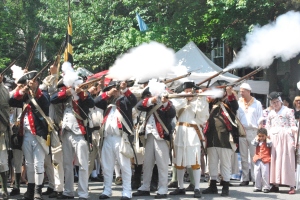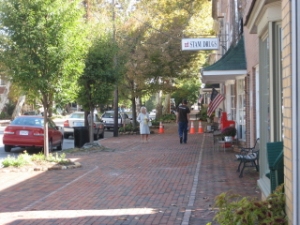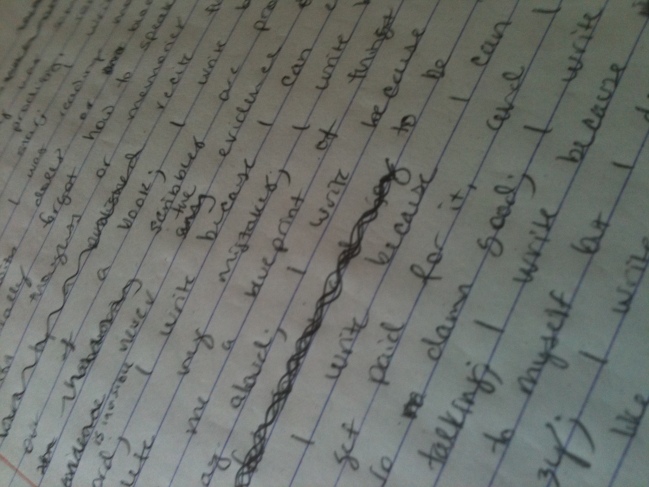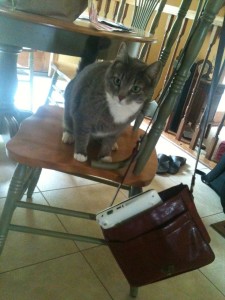I am sunburned. I am tired. I am sweaty. I am a survivor of the annual Chestertown Tea Party.
The start of my Memorial Day weekend consisted of 12 hours of battling crowds under a scorching summer sun, an oversized camera looped around my neck, a flip video camera in one hand and a notebook and pen in the other.
As exhausted and achy as I am though, even feeling like an invasive, nosy reporter didn’t prevent me from having a spectacular time downtown.
For those of you who don’t know (and most of you probably don’t), the Chestertown Tea Party is an annual celebration of the town’s rebellion against the British in 1774. According to legend, a group of furious freedom-fighting C-town residents rallied together in fury over the new British tea taxes, marched down to the river, and, following the example of their brave Boston brothers, dumped all the English tea overboard (along with a few redcoats, naturally).
But here’s the kicker: There’s no historical evidence that the tea party actually happened. The earliest direct mention of the legendary rebellion is from 1899, and it’s not even that reliable of a source. Even if the tea party was as monumental as its reenactors present it to be, there’s a good chance the story has been emebellished over the years as it was passed down from generation to generation, mostly recorded by storytellers in taverns and beside family fireplaces.
There were undeniably residents who disagreed with taxation without representation. A group of them drafted the famous Chestertown Resolves, in fact, which listed the town’s grievances against its motherland:
1st- RESOLVED, that we acknowledge his majesty George III, King of Great Britain, France and Ireland, to be our rightful and lawful sovereign to whom we owe and promise all dutiful allegiance and submission.
2nd – RESOLVED, that no duty or taxes can constitutionally be opposed on us, but by our own consent given personally, or by our own representatives.
3rd – RESOLVED, that the act of the British parliament of the 7th of George III, chapter 46, subjecting the colonies to a duty on tea, for the purpose of raising revenue in America, is unconstitutional, oppressive and calculated to enslave the Americas.
4th – RESOLVED, therefore, that whoever shall import, or in any way aid or assist in importing, or introducing from any part of Great Britain, or any other place whatsoever, into this town or country, any tea subject to the payment of a duty imposed by the aforesaid act of Parliament: or whoever shall willingly and knowingly sell, buy or consume, in any way assist with the sale, purchase or consumption of any tea imported as aforesaid subject to a duty, he or they, shall be stigmatized as enemies to the liberties of America.
5th – RESOLVED, that we will not only steadily adhere to the foregoing resolves, but will endeavor to excite our worthy neighbors to a like patriotic conduct, and to whoever, amongst, shall refuse his concurrence, or after complying, shall desert the cause, and knowingly deviate from the true spirit and meaning of these our resolutions, w will mark him out and inimical to the liberties of America, and unworthy member of the community, ad a person not deserving our notice our regard.
6th – RESOLVED, that the foregoing resolves be printed, that our brothers in the and other colonies may now our sentiments as therein contained.
Pretty awesome, right? This looks like it was copied right out of a history textbook. Not many towns can say they have documented history of their courageous, revolutionary fight for independence.
Naturally, the annual celebrationis Chestertown’s biggest weekend. Thousands of locals and tourists gather in the center of town each Memorial weekend to sing, dance, dress up, eat, drink (and drink and drink and drink) and reenact their forefathers’ rally for freedom.
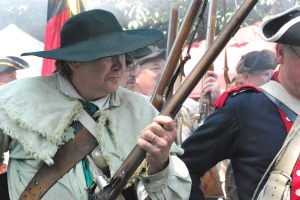
One Chestertown revolutionary, bracing himself for what will one day become a legendary tale of heroics and freedom-fighting.
The tea party celebration is almost as legendary as the supposed event it is based on. In my years living in Chestertown during the school year, I’ve heard locals tell of the unimaginably enormous crowds and street vendors that occupy the otherwise sleepy main streets of town. I tried to picture a group of colonially-garbed residents marching down to the river with guns slung across their shoulders and the parade of men, women, and children following them, but to no avail. I had to actually participate to really understand why the Chestetown Tea Party is the legend it’s become.
I was skeptical (yes, very reporter-ish of me, I know) as I interviewed vendors and residents about their experience. “What’s the point in commemorating an event that might not have even happened?” I thought, as I scribbled down shorthand quotes of “It’s awesome!” and “Down with the British!”
Then then reenactment began. At 2:00, the colonial Chestertownians leapt onto a circle of wooden barrels, and above an eager crowd, declared their enmity against their British taxers. The proverbial march to the sea followed, with the rebels regularly halting to fire their guns at the opposing redcoats.
Something magical happened to the crowd. Suddenly, swept down High Street with the people among whom I usually buy groceries and wait at stoplights, I was in colonial Chestertown. Everyone, myself included, hollered and cheered for freedom under the fierce May sun (which was about as oppressive as any redcoat, I imagine). We applauded when our modest rowboat crept up beside the British cargo ship and the Chestertownians hopped on board. We craned our necks and stood on tiptoe to get as good a view as possible of the sword and fist fights between the British and soon-to-be-Americans. We watched in awe as bundles of tea crashed into the Chester River, and we clapped until our hands were pink and raw as the American flag was finally hurled into the air.
Today, I understand what it means to be a Chestertownian. Who cares if the Tea Party actually happened or not? Even if there was no literal tossing of the tea 200 years ago, there certainly was today. We made real something that may or may not have actually occurred, but the historical accuracy doesn’t really matter after all.
Even if our Chestertown forefathers didn’t have a tea party on the Chester River, one thing’s for sure: They’re watching us somewhere, peeking down at our antics under their three-cornered hats, and I’m sure they couldn’t be prouder.


